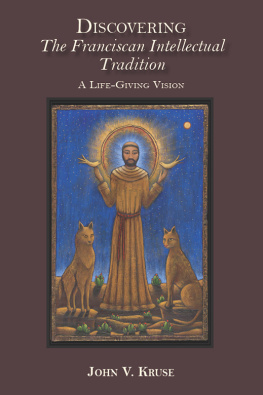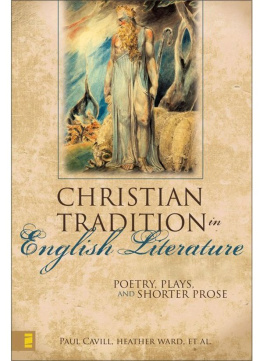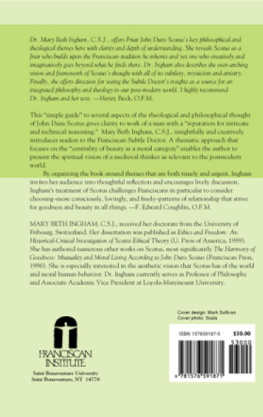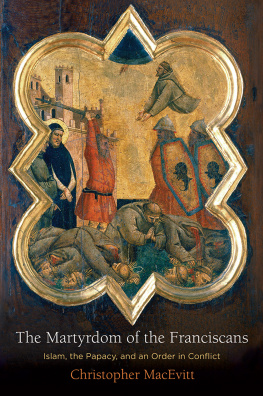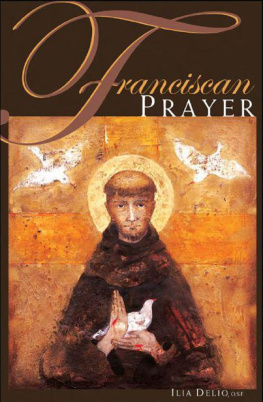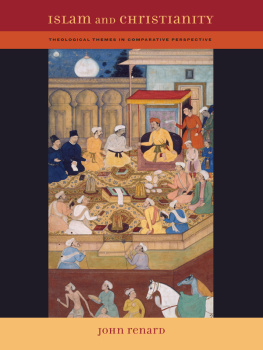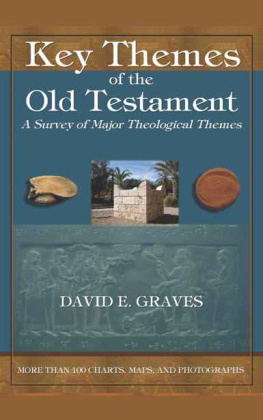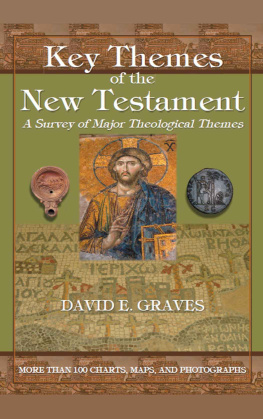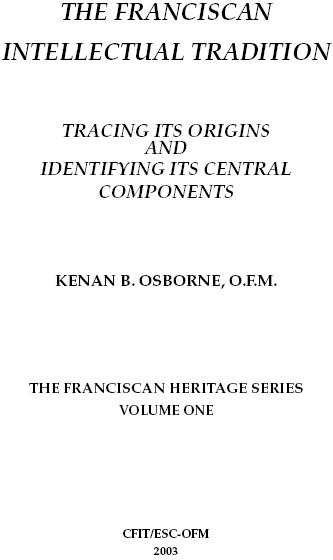
The Franciscan Institute
St. Bonaventure University
St. Bonaventure, NY 14778
2003
This pamphlet is the first in
The Franciscan Heritage Series
sponsored by the
Commission on the Franciscan Intellectual Tradition
of the English-speaking Conference of the
Order of Friars Minor
(CFIT/ESC-OFM)
General Editor
Joseph P. Chinnici, O.F.M.
Assistant Editor
Elise Saggau, O.S.F.
ISBN
1-57659-200-6
Library of Congress Control Number
2003103891
Printed and bound in the United States of America
BookMasters, Inc.
Mansfield, Ohio
TABLE OF CONTENTS
d
On behalf of the Commission for the Retrieval of the Franciscan Intellectual Tradition (CFIT), I present to you with great pleasure this first volume of The Franciscan Heritage SeriesThe Franciscan Intellectual Tradition: Tracing Its Origins and Identifying Its Central Components by Kenan B. Osborne, O.F.M. The purpose of this first volume is to present some general and major themes of the theological formulation of the Franciscan Intellectual Tradition as these themes intersect with contemporary perspectives. It provides both a fine starting point for further reflection and a solid foundation for future expositions in this series.
Dr. Osborne, a member of the Order of Friars Minor, Province of Saint Barbara, and Emeritus Professor at the Franciscan School of Theology, Berkeley, California, is an internationally recognized theologian who specializes in sacramental theology, Christology, ecclesiology and the multicultural dimensions of Christian theology. He has here presented in brief form an excellent introduction. It is our hope that readers will take this short work and, with careful and thoughtful study, perhaps under the guidance of a mentor, begin to plumb the spiritual depths of our inheritance and comprehend the important uniqueness of its intellectual expression. Through reflection, prayer, conversation and action may we also explore these theological themes as they might be expressed in preaching, pastoral practice, the works of evangelization and community formation with friars, sisters and laity.
This present work takes its place within the context of a much larger Franciscan Heritage Series, which we hope will encompass topics such as Creation, the Iconography of the Crucified, Christian Anthropology, Ecclesiology, Scriptural Themes, Evangelization, History, the Natural Sciences, the Arts and other areas of contemporary concern. As the volumes develop, we hope also to include some of the many different carriers of our Franciscan Traditionnot just Francis and the cleric theologians, but also Clare, the women penitents and the laity.
Before our readers begin to taste the first fruit of a large and expansive feast, however, we must briefly indicate, in this Introduction, the origins of the Heritage Series, its relationship to a major initiative in the English-speaking world, and its connections with some significant trajectories in the social and ecclesial experience of the brothers and sisters of the thirteenth-century foundational period of the Franciscan family.
The Franciscan Intellectual Tradition Project
In March 2001, the English-speaking Conference, Order of Friars Minor, undertook an initiative for the contemporary retrieval of the Franciscan Intellectual Tradition. Composed of the leaders of the provinces and other entities of England, Ireland, Canada and the United States, the Conference established an inter-obediential commission to facilitate the coordination and networking of various publications and popular initiatives that were already taking place throughout the English-speaking world in the various countries which were represented. As one its first initiatives, this Commission for the Retrieval of the Franciscan Intellectual Tradition (CFIT) composed and published a strategic five-year plan, the purpose of which was sevenfold:
- To identify the major themes of the Franciscan Intellectual Tradition;
- To provide training programs and resources for formators and those called to serve in leadership with respect to the nature and unique contributions of the Franciscan Intellectual Tradition;
- To network and foster collaboration among the current Franciscan study centers of the English-speaking world: The Franciscan Institute and School of Franciscan Studies, St. Bonaventure, New York; the Franciscan School of Theology, Berkeley, California; the Franciscan Study Center, Canterbury, England; and two major theological schools with a Franciscan presence, the Catholic Theological Union in Chicago and the Washington Theological Union in Washington, DC.
- To promote and support the broader and wider articulation and communication of the Franciscan Intellectual Tradition with respect to our evangelizing mission;
- To identify and encourage new scholars, especially among the laity;
- To create new learning opportunities as might be needed, for example, through the establishment of a website and the possibility of distance learning;
- To make a greater and more conscious effort to provide leadership training and resources to Franciscans throughout the English-speaking world.
The Commission decided very early that one of its first major tasks would be to identify the central themes and emphases of the Franciscan Intellectual Tradition, particularly as these were embodied in key theological issues. We decided to begin on the theological level since we felt that the tradition first took on its specific contours in this area and that theological reflection might provide the clearest orientation for our contemporary mission in Church and society. The Commission also recognized, however, that the Franciscan Intellectual Tradition is rich in insights as to how the Christian message might intersect with the fields of politics, economics, psychology, sociology and environmental studies. Its own work would simply be complementing many other initiatives being undertaken in the wider Franciscan family, for example, among the many colleges and universities working to mainstream their inherited Franciscan charism.
After an initial overview statement that was published along with the Strategic Plan in a booklet entitled The Franciscan Intellectual Tradition Project (June, 2001, available from the Franciscan Institute, St. Bonaventure, New York), two significant initiatives were immediately undertaken. The first was the publication of the proceedings of the annual forum on Franciscan theology at the Washington Theological Union. This gathering is designed to interface, at a high scholarly level, the major theological themes of the Tradition with contemporary issues. Two publications represent the first efforts to make these insightful reflections available: The Franciscan Intellectual Tradition (St. Bonaventure, NY: The Franciscan Institute, 2002); Franciscan Identity and Postmodern Culture (St. Bonaventure, NY: The Franciscan Institute, 2003). Subsequent volumes of symposia papers will address Creation, the Church, and Biblical Foundations.
The development and publication of a series of pamphlets entitled The Franciscan Heritage Series is the second major initiative. This Series has a different audience in mind and is pitched at a level different from the Washington Theological Union symposia essays. The Heritage Series is designed to make available to college teachers, preachers, formation directors, pastoral workers, and lay persons associated with the Franciscan movement some of the basic themes dominant in our Intellectual Tradition. The character of these offerings is less academic. While they presuppose some training in philosophy and theology, they try, as much as possible, to keep scholarly references to a minimum and to avoid the technical language associated with medieval scholasticism. Although each is complete in itself, no one volume is fully expository. In the long run, we hope that the compilation of multiple volumes will enable the lively student to grasp the Franciscan Intellectual Tradition in its totality.
Next page

